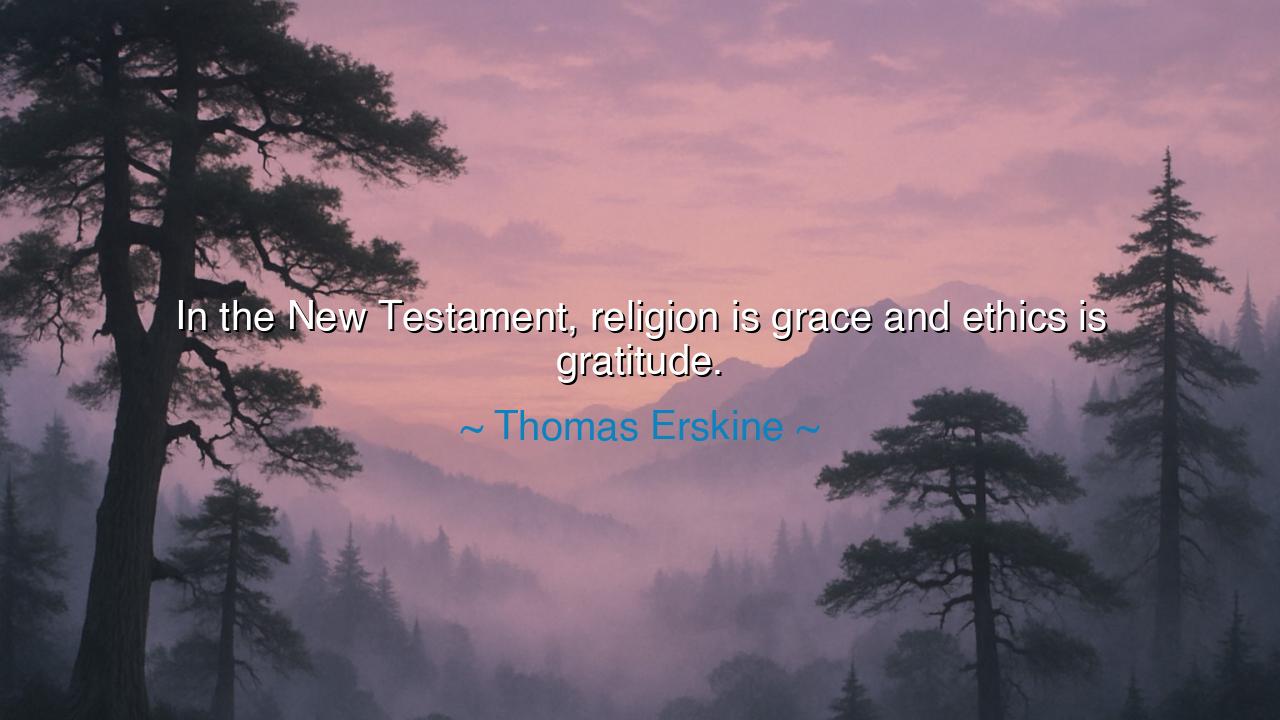
In the New Testament, religion is grace and ethics is gratitude.






“In the New Testament, religion is grace and ethics is gratitude.” – Thomas Erskine
In these sacred words, Thomas Erskine, the quiet philosopher of faith, revealed a truth as radiant as dawn breaking over the soul. He spoke not of doctrines nor rituals, but of the living heart of religion—a heart that beats with grace—and of human conduct, the outward bloom of an inward gift, which is gratitude. In the New Testament, God does not command through fear, nor demand through judgment. Instead, He stoops in mercy, gives freely, and calls mankind not to servitude, but to love. This is grace—the unearned favor, the divine light that shines even on those who do not deserve it.
To understand this truth, one must see that in the old order, men sought to earn righteousness through toil, through law, through the endless weight of obedience. But when Christ came, He shattered that yoke and replaced it with love. The religion of grace is not a transaction; it is a revelation that God gives Himself to man, not because man is worthy, but because God is love. In that single act of divine generosity lies the foundation of all ethics—not born of duty, but born of gratitude. For when a man knows he is loved beyond measure, his heart cannot help but overflow in goodness.
Consider the story of the Apostle Paul. Once a persecutor, fierce and zealous for the law, he believed holiness came through severity and punishment. Yet, when he met grace on the road to Damascus, he was undone. The light of heaven blinded his eyes but opened his soul. From that moment, his every word, every labor, every act became an offering of gratitude. He no longer obeyed because he must, but because he was loved. The cruel Saul died that day, and Paul was born—the man whose ethics were gratitude itself, whose works were not for reward, but for the joy of service to grace.
Erskine, gazing upon the teachings of Christ, saw that all morality rooted in fear is brittle, and all religion built on pride is hollow. True ethics, he taught, flow naturally from the recognition of grace. When we truly perceive that life itself is a gift, that forgiveness is unearned, and that mercy flows endlessly from the Divine, then our deeds are transformed. They cease to be obligations and become songs of thanksgiving. The hands that once strained to prove worthiness now move gently to serve others, not from guilt, but from gratitude.
This truth shines even in the stories of our world beyond the Scriptures. Consider the nurse who tends to the sick, not for wealth, but because she has seen suffering and knows compassion. Or the soldier who, spared from death, devotes his days to peace. Such people act not from commandment, but from thankfulness—their ethics rise from the deep well of gratitude for the grace they have known. They do not merely follow rules; they embody love.
And so, religion and ethics become two parts of one great river—the first, the grace that flows from God to man; the second, the gratitude that flows from man to God and to his fellow beings. Grace descends; gratitude ascends. Between the two, the circle of divine love is complete. Where grace is forgotten, religion turns into pride. Where gratitude is absent, ethics turn into cold law. Only when both dance together does the soul find its true harmony.
Therefore, my child of the spirit, remember this: you need not earn the sun to feel its warmth. Live in grace, and let your every breath be gratitude. Do not serve out of fear, but out of love. When you rise each morning, whisper thanks; when you act, let kindness be your offering. In a world of striving and judgment, be one who remembers that the highest goodness is not repayment—but response. Live as though every heartbeat were a gift, for indeed, it is. And from that fountain of gratitude, let your ethics flow, gentle and enduring, like the river that begins in heaven.






AAdministratorAdministrator
Welcome, honored guests. Please leave a comment, we will respond soon